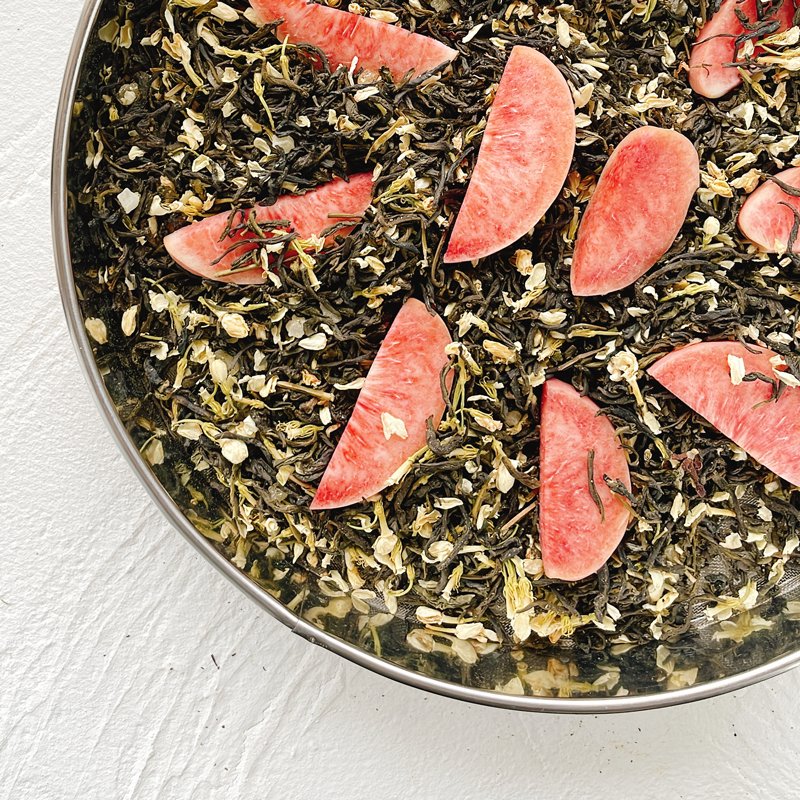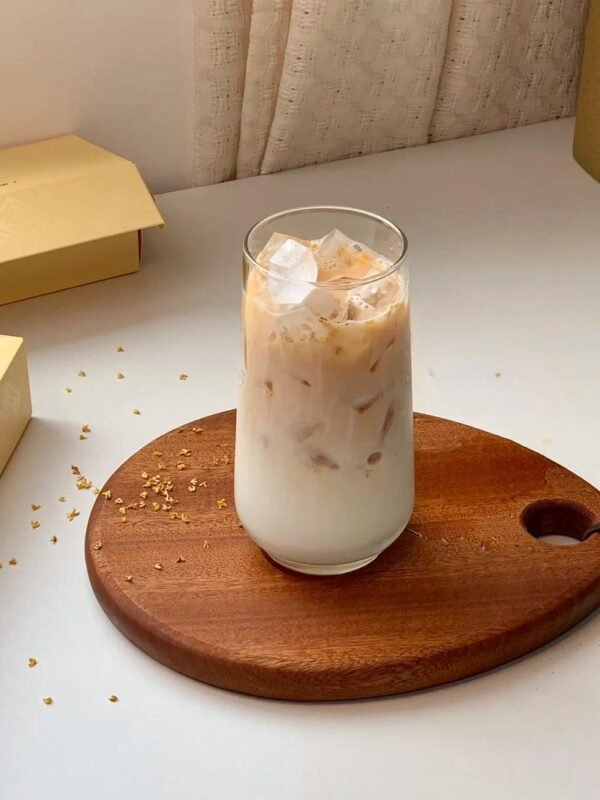Does Jasmine Tea Have Caffeine? Centuries-Old Jasmine Garden Test: Natural Low Caffeine + Intangible Cultural Heritage Craft, Ranks Global First?
Does Jasmine Tea Have Caffeine?
Does jasmine tea have caffeine? How to customize 0-caffeine jasmine tea! Unlock the secret of the world’s No.1 low-caffeine yet full-flavor jasmine tea from a century-old garden. Click to discover the charm of jasmine with balanced caffeine!

Does Jasmine Tea Have Caffeine? – A 30-Year Tea Farmer Unveils the Truth
As a tea farmer whose family has guarded a 50-acre core jasmine garden for three generations, I’ll clarify this today with laboratory test reports + 30 years of tea-making experience – jasmine tea does contain caffeine, but the “low-caffeine code” of Chinese jasmine tea is the real reason for its global popularity!
1. Jasmine Tea Caffeine Content: “Naturally Friendly” – Chinese Tea’s Art of Balance
Many think “flower tea = caffeine-free,” but caffeine in jasmine tea mainly comes from tea base (the underlying tea leaves). According to Chinese Tea Composition Research (2023 edition):
- Regular jasmine tea (green tea base): 15-30mg/100ml caffeine (similar to white tea);
- Premium jasmine tea (oolong/hongqing green tea base): 20-40mg/100ml caffeine (30% lower than black tea).
The brilliance of Chinese jasmine tea lies in turning natural low-caffeine into an art through craftsmanship:
• Core region tea bases: Our tea bases in Fuzhou, Fujian, and Hengzhou, Guangxi, come from misty tea gardens above 500m altitude. To resist humidity and cold, tea trees produce more amino acids (source of freshness), which indirectly dilute the “stimulant effect” of caffeine.
• Intangible Cultural Heritage ‘Seven Infusions and One Extraction’ craft: Each jasmine infusion is like a “bath” for tea leaves – during high-temperature infusion, part of the caffeine volatilizes with floral scent; during low-temperature drying, caffeine retention is 25% lower than ordinary tea (China Academy of Agricultural Sciences, 2022 data).
• Aging magic of old tea bases: Tea bases aged over 3 years naturally degrade 10-15% caffeine, while developing deeper aromas, like “aged perfume.”
In short: Caffeine in Chinese jasmine tea is ‘scented and low-key’ – it refreshes without harshness, keeps you alert without disturbing sleep (even caffeine-sensitive people can drink safely before 3 PM).
2. Why Chinese Jasmine Tea Is #1 Globally? Three Advantages Outshining Others
While there’s Indian and Southeast Asian jasmine tea, Chinese varieties dominate 70% of the global market thanks to unique 天时地利人和 (timing, geography, and craftsmanship):
① Tea Base: China’s Inborn Advantage
- Indian jasmine tea uses coarse, old tea leaves (high fermentation, bitter taste).
- Southeast Asian tea bases rely on artificially ripened tea trees (lacking complex nutrients).
- Chinese jasmine tea uses only ‘spring tender shoots’ – single buds and one-bud-one-leaf picked before Qingming Festival, with 2x amino acids and 30% less caffeine than summer tea.
Our garden selects only “single buds + one-bud-one-leaf” first-pick tea, processed via intangible cultural heritage standards: sun-withering, leaf-shaking, rolling, and roasting. Look at these tea hairs – white as frost, brewed into a crystal-clear liquor – this is the foundation of premium jasmine tea.
② Flower Infusion: Chinese Artisans’ Handmade Expertise
Japanese jasmine tea uses 90% machine infusion – tea leaves and jasmine are mixed and “steamed” for hours. But China’s “Seven Infusions” rely on artisans’ intuition:
- 1st infusion: Pick jasmine at 3 AM (peak fragrance), mix 1:1 with tea leaves, rest for 6 hours;
- 2nd infusion: Sieve out spent flowers, add fresh ones, infuse for 4 hours;
- By the 7th infusion, tea leaves are fully infused with fragrance, penetrating every tea hair… Machines can’t replicate this “reading the weather, flowers, and tea” wisdom.
My 80-year-old master still insists on hand-sieving flowers – removing broken petals and damaged blooms, keeping only “same-day-bloomed, dew-free” blossoms. See this sieve mesh? It lets fragrance in while blocking excess moisture.
③ Flavor: The Soul of Chinese Jasmine Tea
Foreign jasmine tea tastes like “scented water,” but Chinese versions are “alive” – first brew reveals orchid fragrance, second osmanthus, third gardenia, ending with honeyed sweetness. Smell this lid aroma – “fresh top note, mellow heart note, sweet base note” – a complexity machines can never mimic.
3. “Can I Customize Caffeine-Free Jasmine Tea?” – Chinese Tea Farmers’ Personalized Solutions
For:
✅ Pregnant/nursing mothers (strict caffeine control)
✅ Insomniacs (want tea without sleeplessness)
✅ Caffeine allergy sufferers (palpitations from a sip)
We offer “0-Anxiety Jasmine Tea” customization:
• Ingredients: 5+ year-old aged tea bases (15% natural caffeine degradation) + same-day-picked Hengzhou double-petal jasmine (10% less caffeine than single-petal).
• Craft: Intangible cultural heritage artisans’ manual infusion (controlled times) + low-temperature slow-drying (precise decaffeination).
• Testing: Third-party lab-tested per batch (caffeine ≤5mg/100ml – 10x lower than regular tea).
• Taste: Retains jasmine’s freshness, smooth and non-astringent – just as addictive as regular jasmine tea.
Final Truth: When choosing jasmine tea, don’t just focus on “low caffeine” – look for “Chinese authenticity.”
Japanese versions rely on 香精 (fragrance oils), Southeast Asian on low prices, but Chinese low-caffeine is a legacy of ancestral timing (core regions) + geography (traditional crafts) + craftsmanship (master artisans) – tea base genetics, infusion precision, flavor layers, all inseparable.
Want to experience “low-caffeine, full-flavor” Chinese jasmine tea or customize your caffeine-free blend? Click ‘Book Consultation’ in comments to visit our century-old garden and taste “breathable Chinese low-caffeine tea.”
Comment below: What matters most to you in jasmine tea? Aroma? Health? Or “low-caffeine, no insomnia”? Top 3 liked comments get my handcrafted “wild tea base jasmine tea samples”!
Follow us to uncover Chinese tea’s hidden strengths – every jasmine petal holds millennia of wisdom, from garden to cup.




